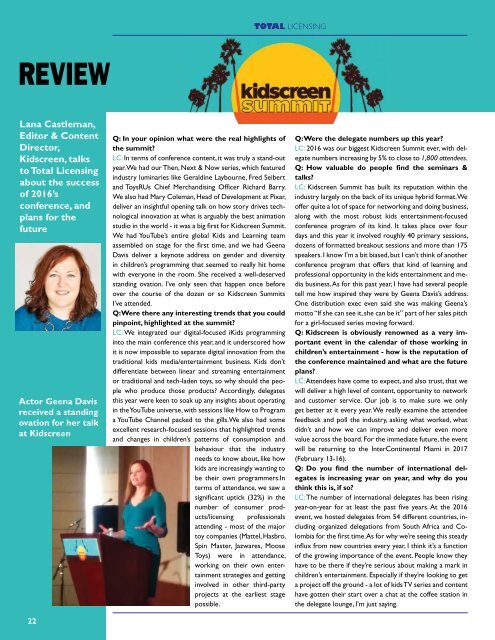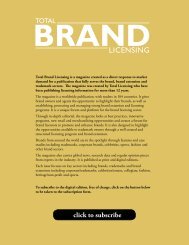Total Licensing
Create successful ePaper yourself
Turn your PDF publications into a flip-book with our unique Google optimized e-Paper software.
TOTAL LICENSING<br />
REVIEW<br />
Lana Castleman,<br />
Editor & Content<br />
Director,<br />
Kidscreen, talks<br />
to <strong>Total</strong> <strong>Licensing</strong><br />
about the success<br />
of 2016’s<br />
conference, and<br />
plans for the<br />
future<br />
Actor Geena Davis<br />
received a standing<br />
ovation for her talk<br />
at Kidscreen<br />
22<br />
Q: In your opinion what were the real highlights of<br />
the summit?<br />
LC: In terms of conference content, it was truly a stand-out<br />
year. We had our Then, Next & Now series, which featured<br />
industry luminaries like Geraldine Laybourne, Fred Seibert<br />
and ToysRUs Chief Merchandising Officer Richard Barry.<br />
We also had Mary Coleman, Head of Development at Pixar,<br />
deliver an insightful opening talk on how story drives technological<br />
innovation at what is arguably the best animation<br />
studio in the world - it was a big first for Kidscreen Summit.<br />
We had YouTube’s entire global Kids and Learning team<br />
assembled on stage for the first time, and we had Geena<br />
Davis deliver a keynote address on gender and diversity<br />
in children’s programming that seemed to really hit home<br />
with everyone in the room. She received a well-deserved<br />
standing ovation. I’ve only seen that happen once before<br />
over the course of the dozen or so Kidscreen Summits<br />
I’ve attended.<br />
Q: Were there any interesting trends that you could<br />
pinpoint, highlighted at the summit?<br />
LC: We integrated our digital-focused iKids programming<br />
into the main conference this year, and it underscored how<br />
it is now impossible to separate digital innovation from the<br />
traditional kids media/entertainment business. Kids don’t<br />
differentiate between linear and streaming entertainment<br />
or traditional and tech-laden toys, so why should the people<br />
who produce those products? Accordingly, delegates<br />
this year were keen to soak up any insights about operating<br />
in the YouTube universe, with sessions like How to Program<br />
a YouTube Channel packed to the gills.We also had some<br />
excellent research-focused sessions that highlighted trends<br />
and changes in children’s patterns of consumption and<br />
behaviour that the industry<br />
needs to know about, like how<br />
kids are increasingly wanting to<br />
be their own programmers.In<br />
terms of attendance, we saw a<br />
significant uptick (32%) in the<br />
number of consumer products/licensing<br />
professionals<br />
attending - most of the major<br />
toy companies (Mattel, Hasbro,<br />
Spin Master, Jazwares, Moose<br />
Toys) were in attendance,<br />
working on their own entertainment<br />
strategies and getting<br />
involved in other third-party<br />
projects at the earliest stage<br />
possible.<br />
Q: Were the delegate numbers up this year?<br />
LC: 2016 was our biggest Kidscreen Summit ever, with delegate<br />
numbers increasing by 5% to close to 1,800 attendees.<br />
Q: How valuable do people find the seminars &<br />
talks?<br />
LC: Kidscreen Summit has built its reputation within the<br />
industry largely on the back of its unique hybrid format. We<br />
offer quite a lot of space for networking and doing business,<br />
along with the most robust kids entertainment-focused<br />
conference program of its kind. It takes place over four<br />
days and this year it involved roughly 40 primary sessions,<br />
dozens of formatted breakout sessions and more than 175<br />
speakers. I know I’m a bit biased, but I can’t think of another<br />
conference program that offers that kind of learning and<br />
professional opportunity in the kids entertainment and media<br />
business. As for this past year, I have had several people<br />
tell me how inspired they were by Geena Davis’s address.<br />
One distribution exec even said she was making Geena’s<br />
motto “If she can see it, she can be it” part of her sales pitch<br />
for a girl-focused series moving forward.<br />
Q: Kidscreen is obviously renowned as a very important<br />
event in the calendar of those working in<br />
children’s entertainment - how is the reputation of<br />
the conference maintained and what are the future<br />
plans?<br />
LC: Attendees have come to expect, and also trust, that we<br />
will deliver a high level of content, opportunity to network<br />
and customer service. Our job is to make sure we only<br />
get better at it every year. We really examine the attendee<br />
feedback and poll the industry, asking what worked, what<br />
didn’t and how we can improve and deliver even more<br />
value across the board. For the immediate future, the event<br />
will be returning to the InterContinental Miami in 2017<br />
(February 13-16).<br />
Q: Do you find the number of international delegates<br />
is increasing year on year, and why do you<br />
think this is, if so?<br />
LC: The number of international delegates has been rising<br />
year-on-year for at least the past five years. At the 2016<br />
event, we hosted delegates from 54 different countries, including<br />
organized delegations from South Africa and Colombia<br />
for the first time. As for why we’re seeing this steady<br />
influx from new countries every year, I think it’s a function<br />
of the growing importance of the event. People know they<br />
have to be there if they’re serious about making a mark in<br />
children’s entertainment. Especially if they’re looking to get<br />
a project off the ground - a lot of kids TV series and content<br />
have gotten their start over a chat at the coffee station in<br />
the delegate lounge, I’m just saying.











